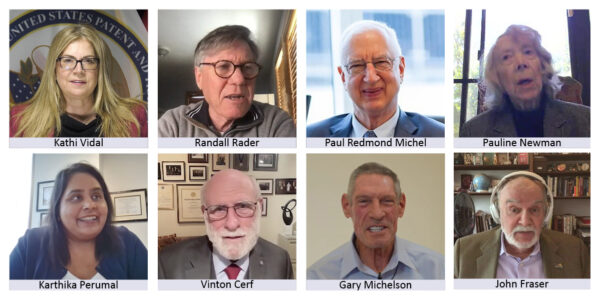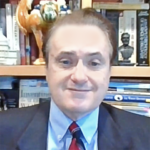LES celebrated World IP Day 2024 with a dynamic discussion moderated by Ray Van Dyke in a webinar on Friday, April 26. The 17 Sustainable Development Goals (SDGs), a blueprint for our planet, were the central theme as panelists discussed how we can use innovation and the IP system to improve the world. The expert panel included these thought leaders in IP:
Raymond Van Dyke, Attorney, Van Dyke Intellectual Property Law
Karthika Perumal, LES Past-President and Partner, Womble Bond Dickinson LLP
Randall Rader, Former Chief Judge, U.S. Court of Appeals for the Federal Circuit
Kathi Vidal, Director, USPTO
Dr. Gary Michelson, Founder and Co-Chair at Michelson Philanthropies
Pauline Newman, Circuit Judge, U.S. Court of Appeals for the Federal Circuit
Dr. Vinton Cerf, Vice President and Chief Internet Evangelist, Google
Paul Redmond Michel, Former Chief Judge, U.S. Court of Appeals for the Federal Circuit
John A. Fraser, President, Burnside Development and Associates

Each panelist contributed insights and knowledge to bolster IP rights that would incentivize innovation and achieve a more equitable distribution of wealth. Judge Pauline Newman suggested educating more members of the public and helping emphasize to diverse communities how IP impacts innovators in positive ways. Judge Paul Michel encouraged continuing legislative advocacy efforts for PERA (Patent Eligibility Restoration Act) and PREVAIL (Promoting and Respecting Economically Vital American Innovation Leadership Act) before Congress to reform patent eligibility, strengthen the patent system, and promote technology commercialization. Panelists also asked how universities can get help with the high costs of patenting and commercializing innovations, especially in bringing discoveries to market. Remarks from each panelist follow.
Karthika Perumal, LES Past-President, welcomed attendees and highlighted LES and its part in LES International (LESI). She said, “I’m excited to be part of a program and listen as people talk about how IP and sustainability work together because it’s a key aspect of our high-tech energy life sciences and consumer sectors at LES.” She then added, “LES and its members are committed to further enhancement of productive collaborations to support sustainability in our deals.”
Patent law reform, international competition, and innovation
Judge Randall Radar shared insights on IP advocacy and education and emphasized the role of IP in sustainable innovation. He discussed challenges in the modern IP system, including the disassociation of validity and infringement. Judge Radar also warned that in 38 out of 44 major areas of technology, China has already surpassed the U.S. in the number of patent filings and the quality of those filings. He discussed U.S. patent system challenges and potential Supreme Court intervention.
Judge Radar added, “The federal circuit should fulfill the purpose of its creation to strengthen and unify patent law by accepting the Supreme Court’s invitation to step in and clarify these doctrines and make sure they work.”
Intellectual Property education and diversity in entrepreneurship
Next up, Dr. Gary Michelson discussed the importance of educating children about intellectual property, citing the need to combat misconceptions about patents creating “evil monopolies.” He highlighted the importance of democratizing intellectual property and having the opportunity to live up to your potential. Van Dyke emphasized the need to educate younger generations, particularly those from underrepresented groups, to see intellectual property as a possibility for themselves. The provisional patent system is a low-cost and helpful tool for all inventors.
They both agreed that inventors need creativity, knowledge, imagination, permission, challenge, and perseverance to succeed.
IP and Sustainable Development Goals
USPTO Director Kathi Vidal stated, “This year’s theme for World IP Day is especially apt—IP and the Sustainable Development Goals, SDGs, building our common future with innovation and creativity. The 17 Sustainable Development Goals address many of the pressing problems our world faces. Hunger, poverty, and climate change, while also promoting solutions that foster greater access and inclusivity, promote fairness and justice, and encourage sustainable and inclusive economic growth.”
She also points to funding entrepreneurship and highlights the Patents for Humanity Green Energy and similar initiatives. She reported on all the ways the USPTO supports and encourages inventors. And concluded with a message to LES members, “I encourage members of LES to join us and help us emphasize to diverse communities how IP impacts innovators, inventors, and entrepreneurs in immeasurably positive ways.”
Legal issues, technology, and Federal Circuit politics
Judge Pauline Newman advocated for bridging legal and scientific cultures. She encouraged teaching science to judges to better understand scientific evidence in court. It was noted that LES helped bring together a domestic policy review in 1978-79 and helped push forward legislation such as the Bayh-Dole Act.
Judge Newman also alluded in her comments to the ongoing internal politics at the Federal Circuit, which prevented her from hearing cases for over a year. The issues are awaiting a tribunal hearing. However, just last year, Kimberly Moore, the current chief judge of the Federal Circuit, said, “There can be no doubt that Judge Newman is the heroine of the patent system.”
Internet history, development, and governance
Dr. Vinton (Vint) Cerf is recognized as the “father of the internet” and discussed his early coding work on the Apollo program. He described his work on the ARPANET project, then developing TCP protocols and connecting different networks. This work led to the “birth of the internet” on January 1. 1983.
Dr. Cerf proposed a federal networking council to connect MCI Mail to the internet. In 1989, the Internet Society was formed to support the growth and improvement of the Internet.
He has been Chief Internet Evangelist at Google since 2005 and shared his journey from MCI to Google, including his role in building internet backbones.
Interplanetary Internet development and digital preservation
Dr. Cerf discussed his involvement in ICANN (Internet Corporation for Assigned Names and Numbers), including serving as chairman (2000-2007). He described the development of an interplanetary backbone network, including the Bundle Protocol Suite, to address communication challenges in space travel.
Dr. Cerf commented about digitized information (text, images, sound, etc.) becoming inaccessible due to technological obsolescence. He said, “I’m worried about the longevity of digital information. I want to see our society taking steps to preserve that information by preserving operating systems and application software, copying media into longer-lived formats, and reformatting things if necessary. It should be a standard practice because otherwise, the 22nd century will look back on the 21st century wondering, what happened?”
Intellectual property law and its impact on innovation and sustainability
Judge Paul Michel discussed efforts to pass PERA and PREVAIL acts for patent law reform. He also advocated for legislative solutions to overcome adverse court decisions hindering innovation in the U.S. He indicated the importance of strong IP rights for achieving technological breakthroughs. Judge Michel then discussed efforts to change the public narrative about patents and advocate for legislative action.
He pointed out the length of time and amount of money it takes to bring an invention to market. Judge Michel says, “Because money is at the heart of all of this, we have to strengthen the incentives that previously were well provided by IP. Rather than spending my retirement years doing other things, I’m spending almost all my time trying to help change the public narrative about patents and to get the legislature to act.”
Final Speaker
John Fraser, President of Burnside Development, shared insights on commercializing innovations and leading efforts to help clients succeed.
Fraser says,” As we know, the theme of the workshop is sustainability, focused around the UN sustainable development goals. And in my very simple words, we’ve got to be living on this planet and in a manner that we don’t screw up the viability of the globe for future generations.”
He continues, “Things are rapidly changing, and the role of intellectual property and its monetization will remain a critical element of the future and take on an even larger role.
Ray Van Dyke closed World IP Day by remarking, “The intellectual property system, the engine of industry— critically important to our society, is sputtering and in need of a major tune-up. We will get the adjustments eventually, but until then, all we can do is hope.”

Moderator: Ray Van Dyke, Attorney, Van Dyke Intellectual Property Law

